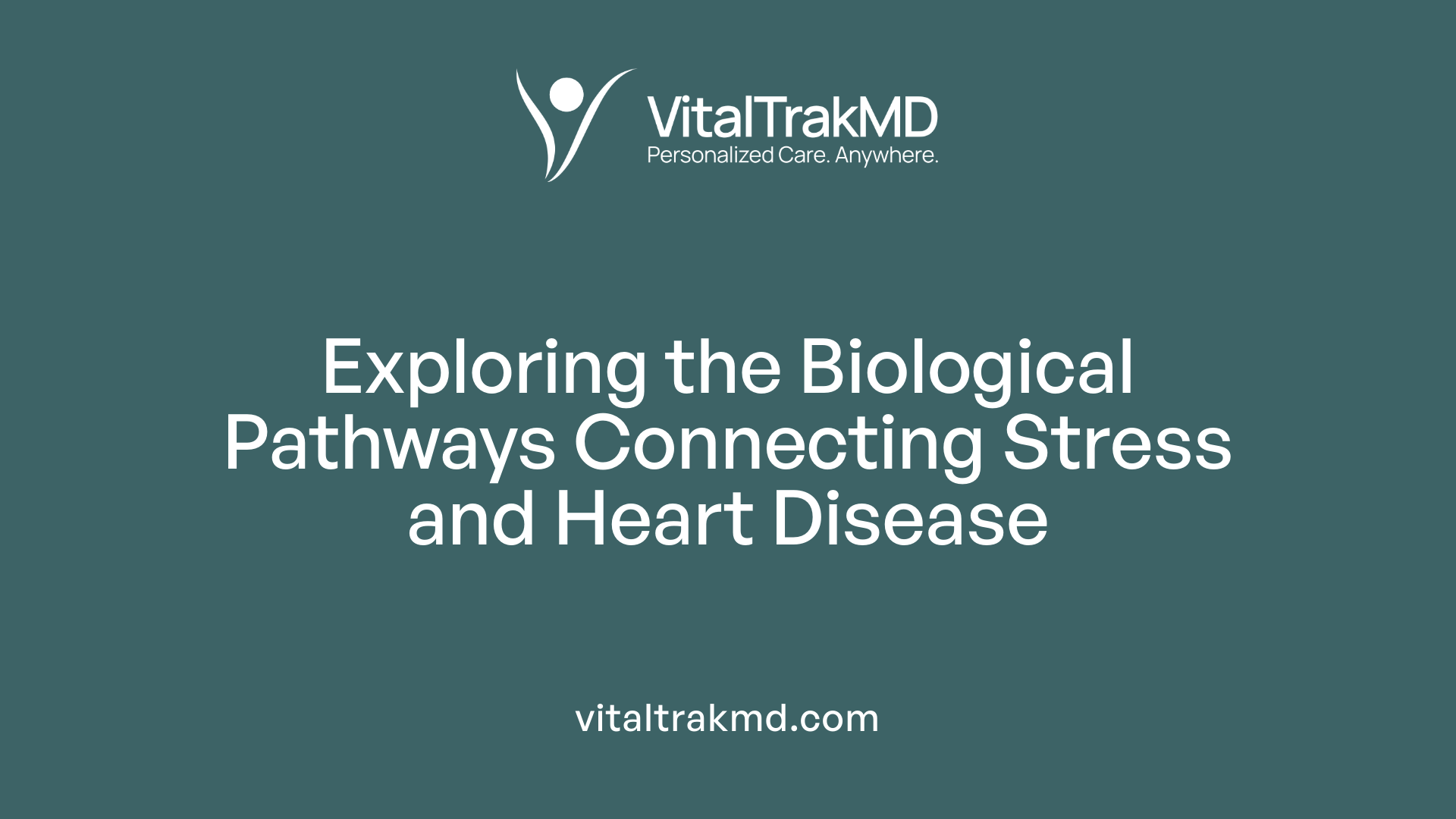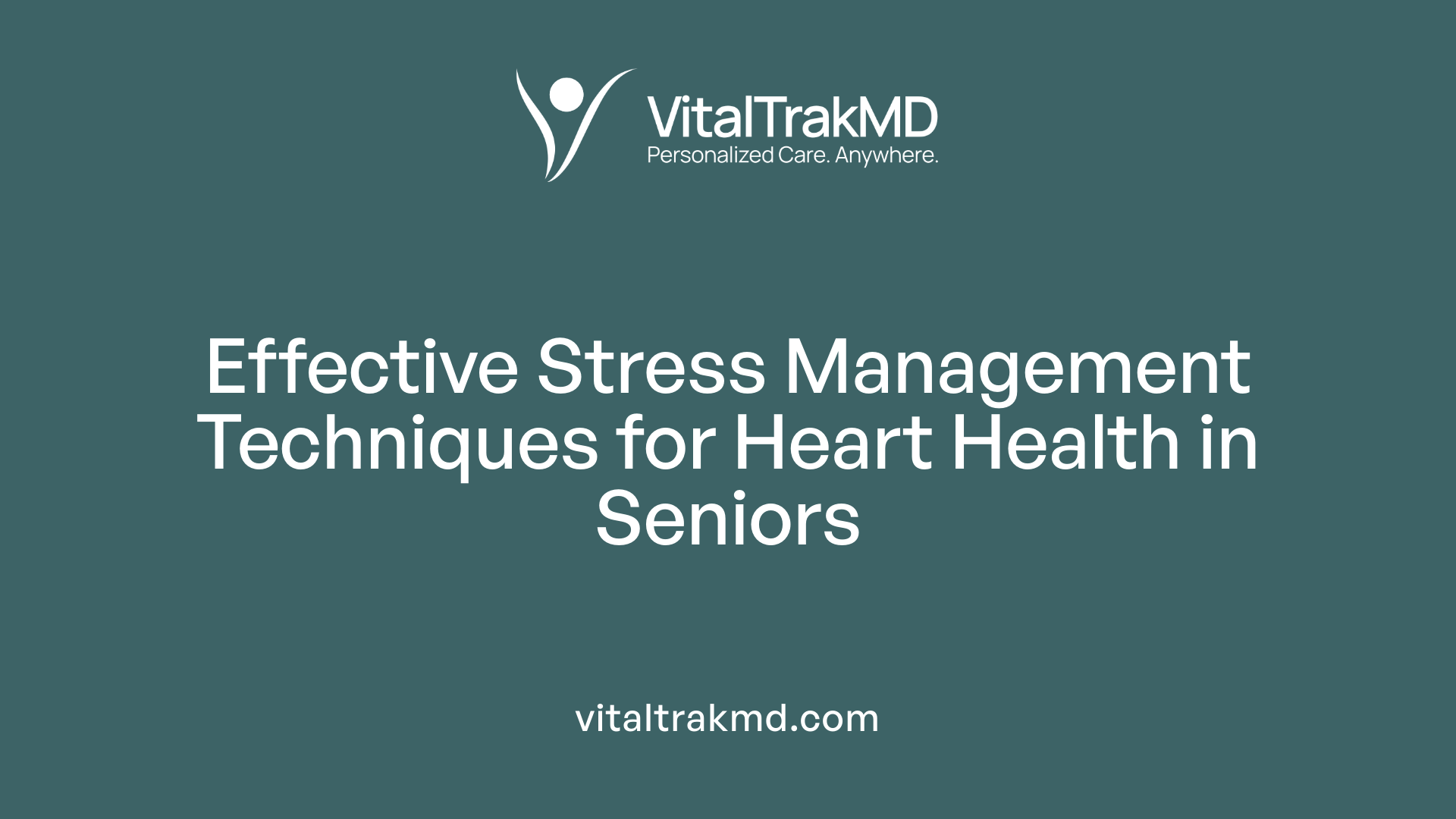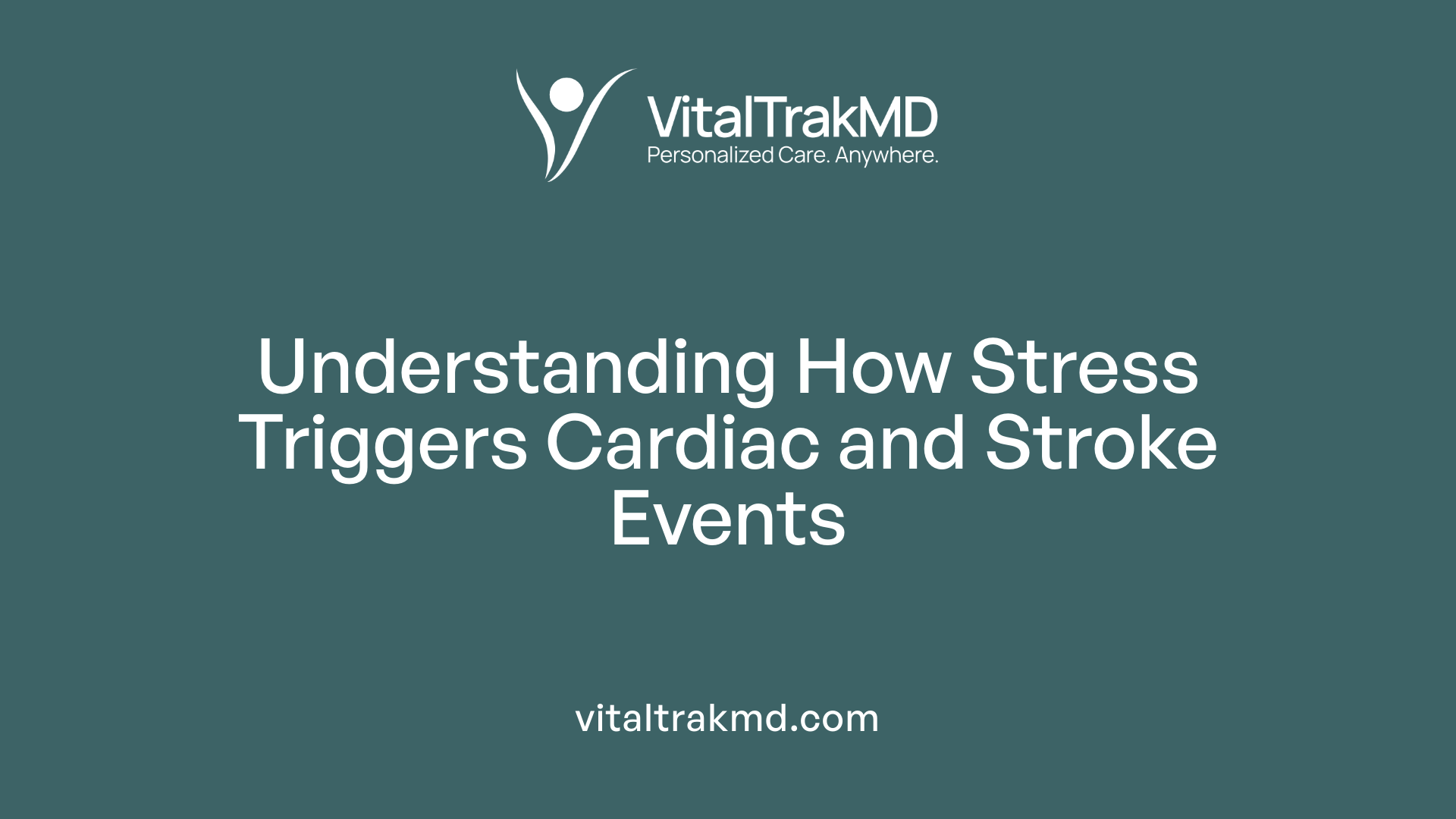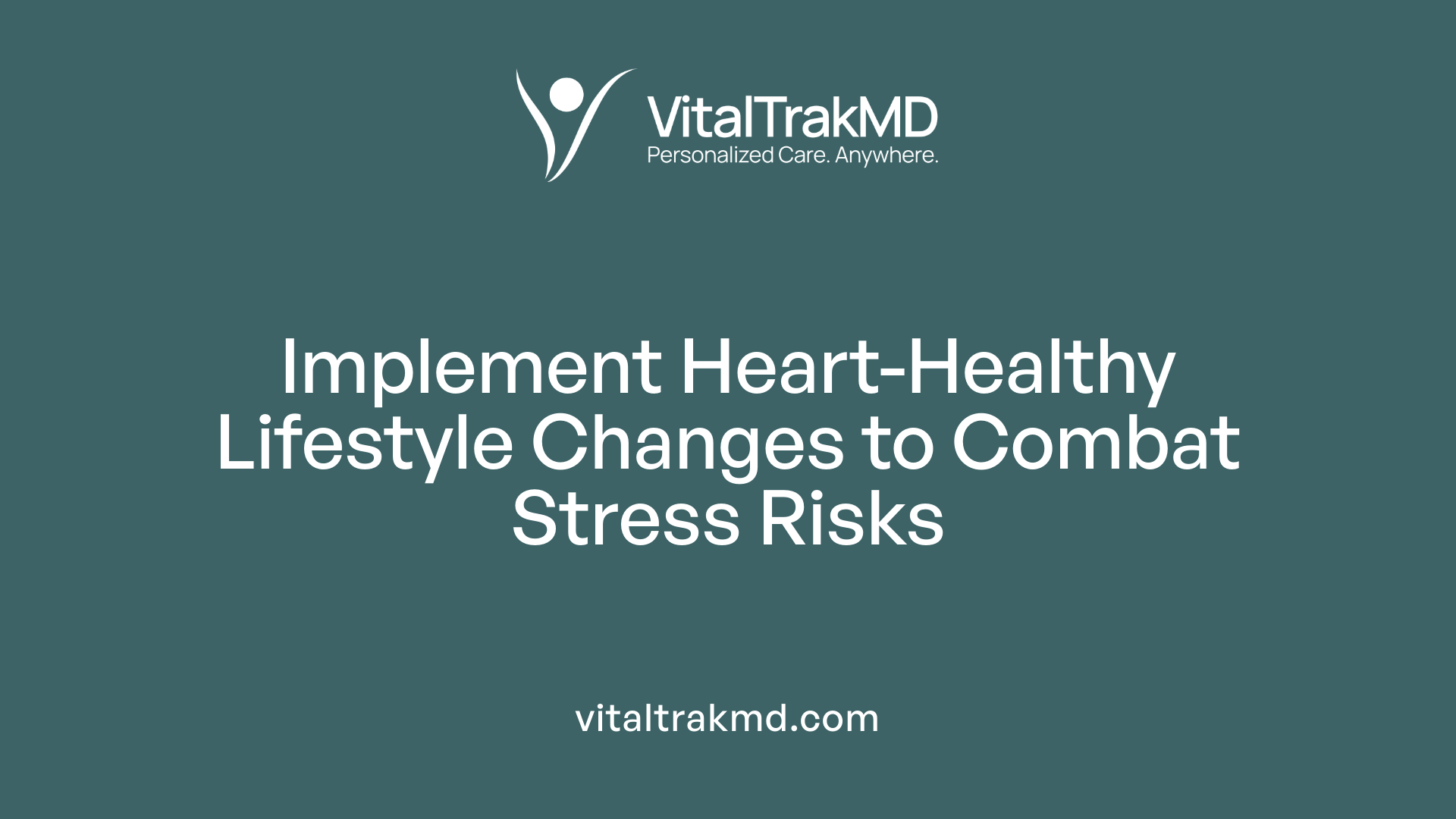How Stress Influences Blood Pressure and Heart Health in Aging Adults

Understanding the Link Between Stress and Heart Health in Older Adults
As individuals age, their cardiovascular system undergoes significant changes that increase susceptibility to stress-related health issues. Psychological and physiological responses to stress can have profound effects on blood pressure regulation and overall heart health. This article explores how stress influences cardiovascular health in aging adults, what mechanisms are involved, and strategies for effective management to promote healthier aging.
Biological and Physiological Mechanisms Linking Stress to Cardiovascular Health

What biological and physiological mechanisms link stress to cardiovascular health?
Stress impacts the cardiovascular system through multiple interconnected biological pathways. One primary pathway involves the activation of the hypothalamic-pituitary-adrenal (HPA) axis. When stressed, the HPA axis stimulates the release of cortisol, a hormone that influences blood pressure regulation, glucose metabolism, and vascular health. Elevated cortisol levels over time can lead to increased blood vessel stiffness, insulin resistance, and high blood pressure, all of which raise cardiovascular risk.
Simultaneously, stress activates the sympathetic nervous system, triggering the release of catecholamines such as adrenaline (epinephrine). This hormone prepares the body for a fight-or-flight response by causing blood vessels to constrict, increasing heart rate, and elevating blood pressure temporarily. Chronic activation of this system can lead to sustained hypertension, which damages arteries and promotes atherosclerosis.
In addition to hormonal changes, stress triggers immune responses that promote inflammation. Persistent inflammation damages the endothelium, the inner lining of blood vessels, making it more prone to plaque formation. This process accelerates atherosclerosis, increasing the likelihood of heart attack and stroke.
Oxidative stress is another key factor. It results from an imbalance between free radicals and antioxidants in the body, leading to cellular damage. Oxidative stress impairs endothelial function—reducing nitric oxide availability, which is vital for blood vessel dilation—and contributes to vascular aging.
Collectively, these mechanisms—hormonal imbalances, immune dysregulation, and oxidative damage—speed up cellular aging within the cardiovascular system. This enhances the risk for cardiovascular diseases, especially in older adults, where age-related changes further compound these effects.
The Role of Age-Related Changes in the Heart and Blood Vessels
How does stress affect blood pressure regulation in older adults?
In older adults, stress triggers hormonal responses that temporarily raise blood pressure, primarily through the release of cortisol and epinephrine. These hormones increase heart rate and cause blood vessels to narrow, prompting short-term spikes in blood pressure.
However, with age, the body's ability to regulate blood pressure effectively diminishes due to structural and functional changes within the cardiovascular system.
One significant change is the stiffening of arteries, a process known as arterial stiffening, which reduces the elasticity of blood vessels. This means that the arteries can’t expand as easily during each heartbeat, leading to higher systolic blood pressure. This stiffening also contributes to the development of isolated systolic hypertension, a common condition in older adults.
Additionally, the heart itself undergoes structural modifications such as chamber enlargement and thickening of the heart wall. These changes can impair the heart's ability to respond efficiently to stressors.
Another factor is the stiffening and thickening of heart valves, which can obstruct blood flow and cause nutrient and oxygen delivery issues.
Furthermore, the reduction in vessel elasticity affects how blood pressure fluctuates in response to emotional and physical stress.
Complicating these changes is the reduced sensitivity of baroreceptors—special receptors that monitor blood pressure and help regulate it during positional changes like standing up.
All these alterations make managing blood pressure more challenging in the aging population, especially under chronic stress conditions.
Fortunately, stress management strategies such as relaxation techniques, physical activity, and healthy lifestyle choices can support better blood pressure regulation.
Understanding how age-related cardiovascular changes influence stress responses emphasizes the importance of tailored approaches to maintain heart health in seniors.
The Psychological and Emotional Impact of Stress on Cardiac Outcomes in Aging Adults
What are the psychological effects of stress on cardiovascular outcomes in aging populations?
In older adults, psychological stress triggers several physical responses that can increase heart disease risk. When stressed, the body releases hormones like cortisol and adrenaline, which elevate heart rate and blood pressure. Over time, these effects can contribute to sustained hypertension, inflammation, and arterial damage.
Negative emotions such as anger, hostility, and anxiety activate the sympathetic nervous system. This activation can lead to acute events like myocardial infarction or stroke, especially when these emotions are prolonged or intense.
Stress also impacts mental health, often co-occurring with conditions like depression and anxiety. These conditions can intensify the physiological effects of stress and promote unhealthy behaviors, such as poor sleep, overeating, smoking, and physical inactivity, which further deteriorate cardiovascular health.
Moreover, a cycle exists where emotional distress worsens physical health, and worsening health increases emotional difficulties. This interconnected cycle highlights the importance of psychological resilience and mental health management in reducing cardiovascular risks among aging populations.
Understanding and managing these emotional and psychological factors are essential for improving long-term heart health and quality of life in older adults.
| Aspect | Impact | Additional Details |
|---|---|---|
| Hormonal response | Increased heart rate, blood pressure | Elevated cortisol and adrenaline levels promote inflammation and vascular damage |
| Emotional responses | Anger, hostility, anxiety | Activate stress pathways, increase risk of adverse cardiac events |
| Behavioral effects | Poor sleep, unhealthy eating, smoking | Behaviors that worsen heart health |
| Psychological conditions | Depression, anxiety | Both contribute directly and indirectly to cardiovascular risks |
| Cycle of distress | Emotional distress and physical health | Each reinforces the other, creating a persistent risk |
This complex relationship underscores the importance of integrating psychological well-being strategies into cardiovascular care for aging adults.
Strategies for Stress Management to Protect Heart Health in Older Adults

What stress management strategies can help protect heart health in older adults?
Managing stress effectively can significantly reduce the risk of heart disease in aging populations. A comprehensive approach involves several practical strategies.
Regular physical activity, such as at least 150 minutes of moderate exercise weekly and strength training, helps lower blood pressure and decrease inflammation. Exercise also reduces stress signals in the brain, supporting emotional well-being and cardiovascular health.
Relaxation techniques, including mindfulness meditation, yoga, and deep breathing exercises, are powerful tools for reducing harmful stress hormones like cortisol. These practices promote relaxation, improve sleep, and enhance overall resilience.
Social support plays a vital role in stress reduction. Maintaining strong relationships and participating in community activities can provide emotional comfort and decrease feelings of loneliness, which are linked to higher cardiovascular risk.
Supporting mental health through counseling, therapy, or support groups is essential, especially for conditions like anxiety and depression. These mental health conditions can elevate blood pressure and promote inflammation, further damaging blood vessels.
Lifestyle habits also influence stress levels. Eating a healthy diet rich in fruits, vegetables, and whole grains while limiting saturated fats and sodium supports heart health. Adequate sleep, typically 7-9 hours per night, helps regulate stress hormones and restore body balance.
Avoiding unhealthy coping behaviors—such as smoking, excessive alcohol consumption, and overeating—is crucial. These habits worsen inflammation and increase blood pressure, counteracting efforts to reduce stress.
Finally, routine medical management includes regular checkups to monitor blood pressure, cholesterol, and other risk factors, enabling early intervention if necessary.
Implementing these strategies collectively can help older adults manage stress effectively, promoting a healthier heart and improved quality of life.
The Impact of Stress Events and Emotions on Heart Attack and Stroke Risk
 Stress and emotional states significantly influence heart health through multiple mechanisms. Acute stress can cause sudden plaque rupture in arteries, which exposes inner vessel walls to blood, triggering the formation of blood clots. These clots can obstruct blood flow, leading to a heart attack or stroke. During episodes of intense mental stress, such as mental stress ischemia, reduced blood flow to the heart occurs more frequently in individuals with existing heart disease. Studies show that people experiencing mental stress ischemia have twice the risk of adverse cardiac events over several years, especially when combined with physical stress.
Stress and emotional states significantly influence heart health through multiple mechanisms. Acute stress can cause sudden plaque rupture in arteries, which exposes inner vessel walls to blood, triggering the formation of blood clots. These clots can obstruct blood flow, leading to a heart attack or stroke. During episodes of intense mental stress, such as mental stress ischemia, reduced blood flow to the heart occurs more frequently in individuals with existing heart disease. Studies show that people experiencing mental stress ischemia have twice the risk of adverse cardiac events over several years, especially when combined with physical stress.
Chronic stress contributes to long-term damage in blood vessels. Persistent exposure to stress hormones like cortisol and adrenaline promotes inflammation and stiffening of arteries, which accelerates plaque buildup—a process called atherosclerosis. This progressive narrowing and hardening of arteries increase the likelihood of blockage and rupture, heightening the risk of heart attacks and strokes.
Many symptoms caused by stress overlap with those of cardiac emergencies. Chest tightness, shortness of breath, irregular or rapid heartbeat, and fatigue often occur during stress episodes and can mimic or trigger true cardiac events. Recognizing these signs and differentiating between psychological stress and heart problems is crucial for timely and effective treatment.
In sum, stressful events and emotions can precipitate dangerous cardiovascular changes, emphasizing the importance of stress management in maintaining heart and vascular health, especially for older adults at increased risk.
Lifestyle Modifications and Medical Interventions for Maintaining Cardiovascular Health Amid Stress

What lifestyle and medical strategies help manage stress-related risks to heart health?
Managing blood pressure and overall cardiovascular risk in stressed individuals involves a combination of dietary changes, medications, and lifestyle habits. Dietary approaches include reducing sodium intake to lower blood pressure, increasing potassium-rich foods to help relax blood vessel walls, and consuming more soluble fiber to improve blood lipid profiles.
Medications such as antihypertensives—including ACE inhibitors, beta-blockers, and diuretics—are often prescribed when lifestyle changes alone are insufficient. These medications help control blood pressure, reducing the strain on the heart and vessels.
Smoking cessation is critical, as smoking accelerates artery stiffening and interferes with blood pressure treatments. Maintaining a healthy weight through balanced eating and regular physical activity supports optimal cardiovascular function.
Regular medical checkups enable early detection and management of hypertension, high cholesterol, and other risk factors. Adhering to prescribed treatments and making consistent healthy choices are essential to offset the adverse effects of chronic stress on the heart.
| Strategy | Benefits | Additional Notes |
|---|---|---|
| Dietary Approaches | Lower blood pressure, reduce inflammation | Reduce sodium, increase potassium, boost fiber |
| Medications | Control hypertension, lower cardiovascular risk | Use as prescribed; monitor effectiveness |
| Smoking Cessation & Weight Loss | Decrease artery stiffness, improve blood flow | Incorporate counseling, support groups |
| Regular Medical Follow-up | Early intervention, medication adherence | Screen for stress impacts and adjust plans as needed |
Effectively combining these strategies can significantly mitigate the cardiovascular consequences of stress. Promoting a heart-healthy lifestyle alongside medical management is vital for aging adults facing chronic stress.
Proactive Approaches for Heart Health in Aging Populations
In summary, stress plays a significant role in influencing blood pressure and heart health as people age. The physiological responses to stress—such as hormone release and inflammation—can accelerate vascular aging, promote plaque formation, and increase the likelihood of cardiovascular events. Recognizing early signs of stress impact and adopting effective stress management strategies, including physical activity, relaxation techniques, social engagement, and medical support, are essential to mitigate these risks. Public health initiatives and personalized medical care that incorporate psychological well-being can foster healthier aging, reduce disease burden, and enhance quality of life for older adults.
References
- Stress and Heart Health | American Heart Association
- Heart Health and Aging | National Institute on Aging
- The Connection Between Stress and High Blood Pressure in Seniors
- How Does Stress Affect the Heart? - Mass General Brigham
- How Stress Affects Your Heart | SBM - Society of Behavioral Medicine
- A longitudinal study of age-based change in blood pressure ...
- Stress Can Increase Your Risk for Heart Disease
- Psychological Health, Well-Being, and the Mind-Heart-Body ...
Recent articles
Want to Feel Better and Live Healthier?
Join hundreds of patients taking control of their health with personalized care that fits their life – not the other way around.
Rated 4.8/5 by 32+ customers







